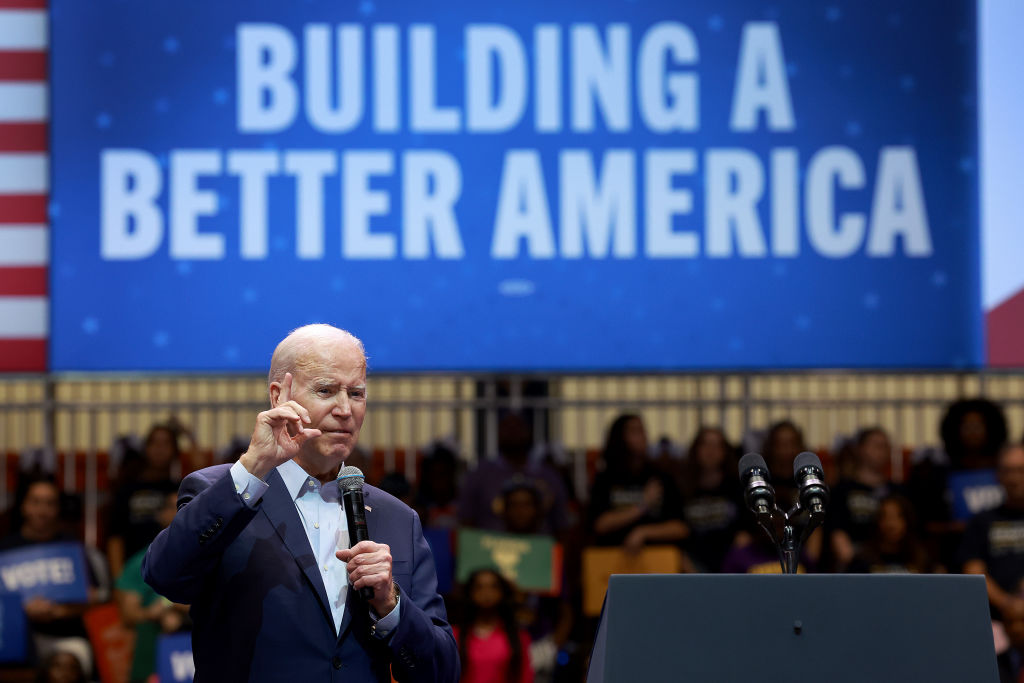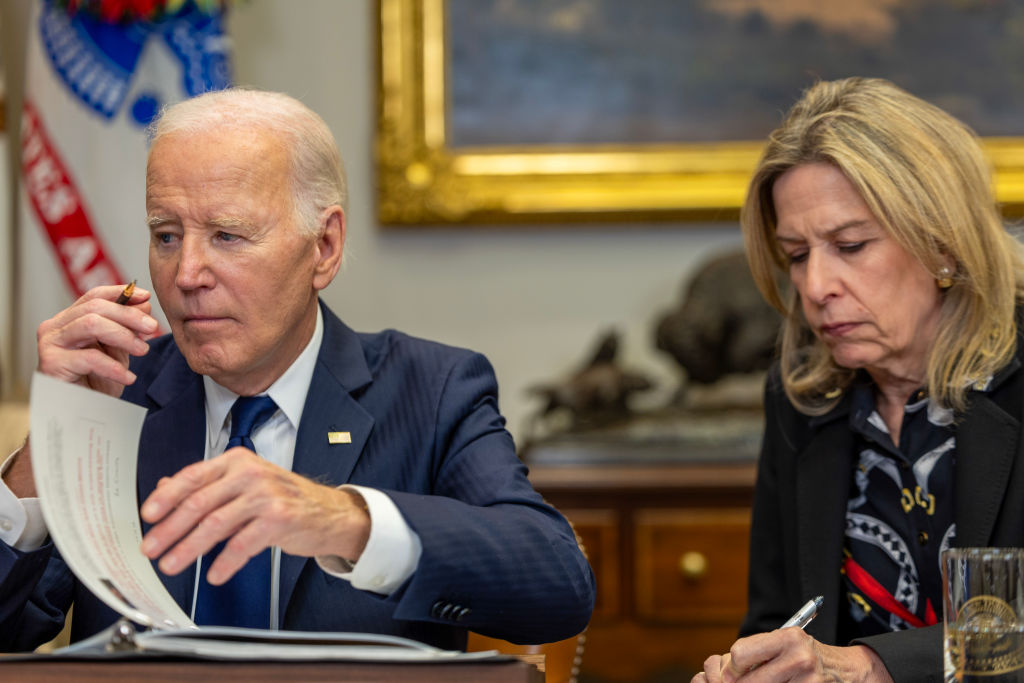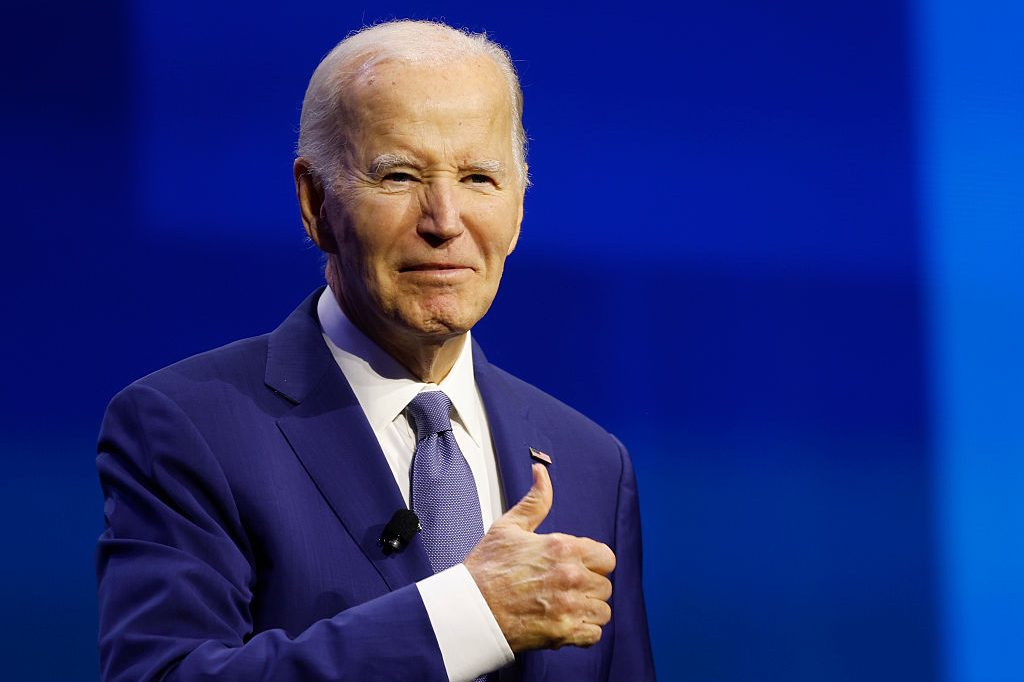What Biden’s midterm meandering reveals
On Tuesday night, Joe Biden characterized next week’s midterms as “a choice between two vastly different visions for America.” It is just one of the ways in which Biden has painted the vote as a high-stakes contest. Earlier in the year, the focus was on “ultra-MAGA” Republicans with the November contest framed as a “battle for the soul of America.” Now he has fallen back on a tried-and-tested Democratic strategy of fear-mongering over Republican designs on Medicare and Social Security.
Hardly an indicator that the president and his party think things are going well. But as striking as Biden’s closing message is, where he is delivering it really drives the message home.
The president spent Tuesday in Florida, where the main statewide Democratic candidates, Charlie Christ and Val Demmings, stand next to no chance of winning against Governor Ron DeSantis and Senator Marco Rubio, respectively.
Tonight he will deliver a speech at Union Station, in Washington, that a White House spokesperson says will focus on democracy, January 6 and threats of political violence.
Tomorrow he will head to New Mexico, where there is no Senate race this year, to tout student debt relief, and that potentially decisive swing state of, er… California. There he will campaign with Democratic incumbent Representative Mike Levin in a San Diego district that Biden carried by double-digits two years ago.
On Saturday he will make a rare appearance in a bona fide swing state home to an important Senate race, speaking at a rally in Philadelphia on Saturday night. Then, on Monday, the president will be in Maryland, home to a one-sided gubernatorial contest and no Senate races.
And if you think I’m focusing unfairly on a narrow slice of the campaign, the Wall Street Journal reports that Biden has been to just six of the fourteen states that the Cook Political Report lists as having the most competitive Senate and governor races.
This is not the itinerary of a president giving it all he’s got in the states that will decide control of Congress and, by extension, his political future. Instead, it confirms one thing and suggests a few others. What is clear is that Biden is an electoral liability and the Democrats know it. Throughout the campaign, Democratic candidates have generally been unenthusiastic about presidential appearances and reluctant to bring his name up with voters.
From there flow other possibilities. If the Democrats have a bad night on Tuesday, the biggest question that follows will concern Biden’s political future. Will the president run in 2024? More to the point, will his party let him run in 2024? (The case for bullishness on Biden’s future rests on the hopelessness of the alternatives, as captured by this unusually funny SNL skit from last weekend.)
Here, Biden’s obvious lack of campaign-trail zeal will loom large in Democrats’ minds. In the fight to cling on to control of the legislature, Biden spent a weekend in Delaware and made the occasional swing through not-especially-competitive states. Perhaps the best defense of that approach is that a more energetic Biden wouldn’t have been much help in Nevada or Arizona or Pennsylvania or Georgia. Perhaps. But if that’s the case, then sound tactics in 2022 point towards vulnerability in 2024.
The White House claims credit for inflation
Speaking of lackluster homestretch messaging, a White House tweet sent Tuesday inadvertently demonstrated just how desperately Biden’s team is scraping the bottom of the barrel for good economic news. “Seniors are getting the biggest increase in their Social Security checks in 10 years through President Biden’s leadership,” read the Tweet. Of course, the thing for which credit is being claimed here is inflation. Social Security increases have been automatically pegged to rising living costs since the seventies.
*** Sign up to receive the DC Diary in your inbox here ***
Polling alarm bells
Nate Cohn is nervous. The New York Times polling guru sees trouble on the horizon, suspecting that surveys may once again be undercounting Republican voters. The New York Times published a slew of polls this week that recorded a relatively strong showing for Democratic candidates. But, Cohn reports, those polls also suggest a big problem with “nonresponse bias”, the problem of one party’s supporters being less likely to respond to surveys than the other’s. “Overall,” writes Cohn, “white registered Democrats were 28 percent likelier to respond to our Senate polls than Republicans — a disparity exceeding that from our pre-election polling in 2020.”
This doesn’t necessarily mean that the polls are wrong. Except, as Cohn explains, “the wide disparity in Democratic and Republican response rates was most likely symptomatic of a deeper nonresponse bias: Biden voters, regardless of their party, were probably likelier to respond than Trump voters. This drove up the Democratic response rate, but it did more than that. It meant there were too many Biden Democrats; too many Biden Republicans; too many Biden independents. Weighting by party wasn’t enough.”
That’s a big red flag for Democrats. And a big headache for pollsters.
What you should be reading today
Leighton Woodhouse: Saving San Francisco
Nicholas Eberstadt: A nation of quitters
David Marcus: We should be better than Paul Pelosi conspiracy theories
David Weigel, Semafor: Democrats had a simple message on abortion in Arizona. Then things got complicated
Ken Klippenstein and Lee Fang, the Intercept: Leaked documents outline DHS’s plans to police disinformation
Nick Catoggio, the Dispatch: Stop the squeal
Poll watch
President Biden job approval
Approve: 42.8 percent
Disapprove: 54.6 percent
Net approval: -11.8 (RCP Average)
Wisconsin Senate race
Ron Johnson (R): 48 percent
Mandela Barnes (D): 46 percent (Fox)

























